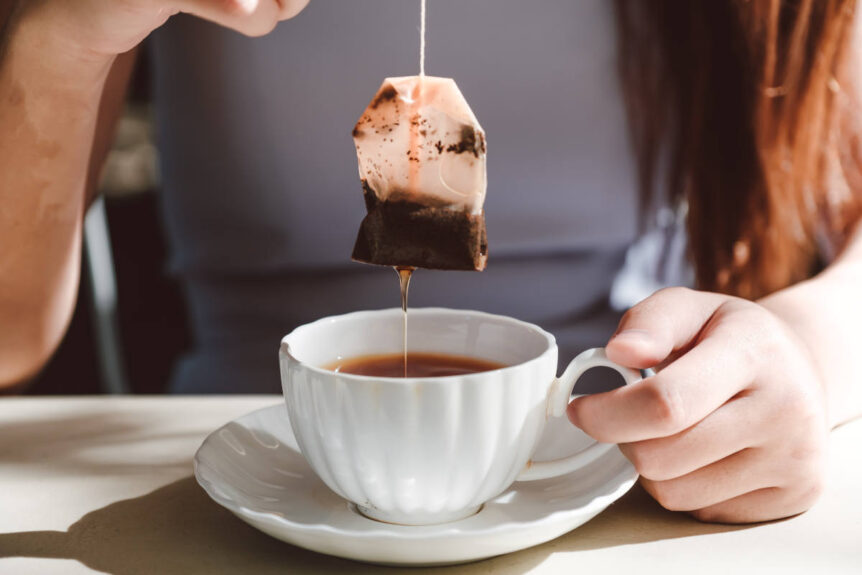
🕵 Finding Out What’s Inside from the Field of Master Mind Health (MMH) 🧍♂️🧍♀️
Shared from the research of: Joseph Mercado 🧒
Article Author: Organic India 🌎
To: Herbal Tea Lover 🍵
Blog Post #1209 📌
Re: Plastic Inside Tea Bags 🎒
Date and Time: Wednesday, March 9, 2022 at 1:28 p.m. ⏰
Dear Herbal Tea Lover,
At Organic India, we believe in plastic-free tea bags to protect your body and the earth; and preserve the pure, organic tea experience that you deserve.
Unfortunately, the industry norm is to include plastic in the mesh tea bag, which releases billions of microplastics and nanoplastics into your infusion.
Consuming microplastics, as you can imagine, can have negative impacts on your health and on the earth.
What are microplastics?
Microplastics are teeny tiny pieces of plastic, less than 5mm in size, that break down from larger pieces of plastic.
While plastic doesn’t biodegrade, it does break down into smaller and smaller pieces that can enter the environment and cause a threat to the ocean, the land, and all life on earth.
Microplastics are everywhere – in the food we eat, water we drink and air we breathe.
However, there are best practices to minimize exposure, such as minimizing consumption of food and drinks that contain plastic in the packaging.
What are nanoplastics?
Nanoplastics, like microplastics, are tiny pieces of plastic; but nanoplastics are even smaller.
While microplastics measure 0.1 μm−5 mm, nanoplastics are a mere 0.001–0.1 μm in size.
Do tea bags contain plastic?
Yes, but not all tea bags. The vast majority of brands on the shelves have mesh tea bags that are composed of 20-30% plastic.
According to studies, a single standard tea bag releases 11.6 billion microplastics and 3.1 billion nanoplastics into every cup of tea.
Consumers are increasingly becoming aware of this fact and opting either for loose teas, or selecting tea brands that have no plastic in the teabag.
Organic India tea bags do not contain plastic, and are made instead of unbleached filter paper that is verified home compostable, biodegradable, Non-GMO, allergen-free and chemical-free.
Is plastic in tea bags harmful?
In short, yes. Microplastics in tea bags can be harmful not only for the environment, but for human health as well.
Microplastics may enter the human system through ingestion, inhalation or dermal absorption.
Studies have shown that microplastics have potential to cause damage to the cells in the quantities currently found in food and beverages like tea.
In addition to cell damage, regular consumption of microplastics may cause immune disruption, neurotoxicity, reproductive toxicity and carcinogenicity in the body.
When it comes to the earth, microplastics enter the environment through human plastic waste that breaks down and contaminates the soil, waterways and ocean with chemicals and harmful microorganisms.
Fish and other aquatic life, even ocean predators like seals, can be harmed by these microplastics, which may cause abnormal behavior, changed feeding patterns, cell damage or developmental issues.
Does organic mean plastic-free?
No. Just because a tea is organic does not mean that there is no plastic in the mesh tea bag.
Plastic is a separate issue that is not overseen by Organic-certifying organizations.
Both organic and non-organic brands may have plastic in the tea bag. At the same time, both organic and non-organic teas may be free of plastic.
Those looking to minimize microplastic exposure can research each individual tea brand to determine whether or not it contains plastic.
Plastic-Free Alternatives:
A good place to start is to look for companies that do not use plastic in their tea bags.
If it is not apparent on the labeling on the box, call or check the FAQs on their website to find out before you purchase your next box of tea.
Another option is to opt for loose leaf teas and use your own stainless steel or silicone tea strainer instead of purchasing bagged teas.
Some also opt for fancy nylon pyramid tea bags, but this option is not biodegradable and can still release microplastics when exposed to hot water.
Content Source: Organic India 🌎

 Email Us a Message
Email Us a Message 

Please send us a personal message below and we will serve you momentarily.
We appreciate you visiting the MMU Global Research Directory
For more blog posts, videos, articles, and to generate more knowledge, please feel free and…






 Fly Over to the MMU Facebook Page with Hoot
Fly Over to the MMU Facebook Page with Hoot
 Visit the MMU Facebook Group Today
Visit the MMU Facebook Group Today